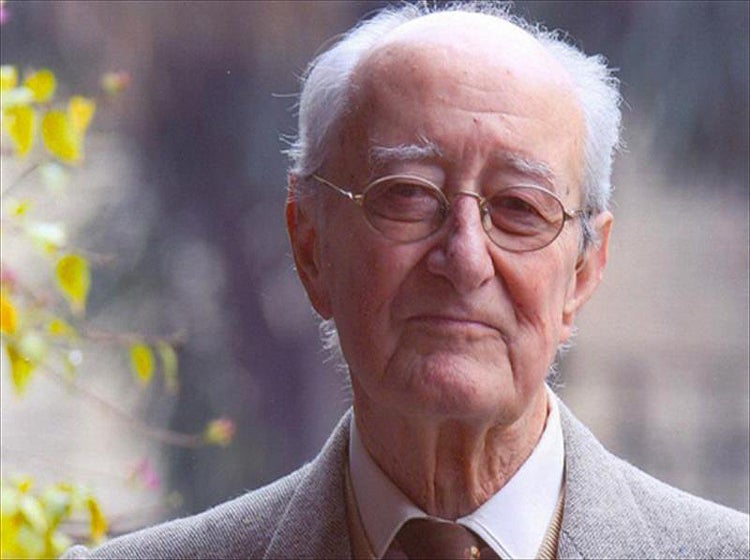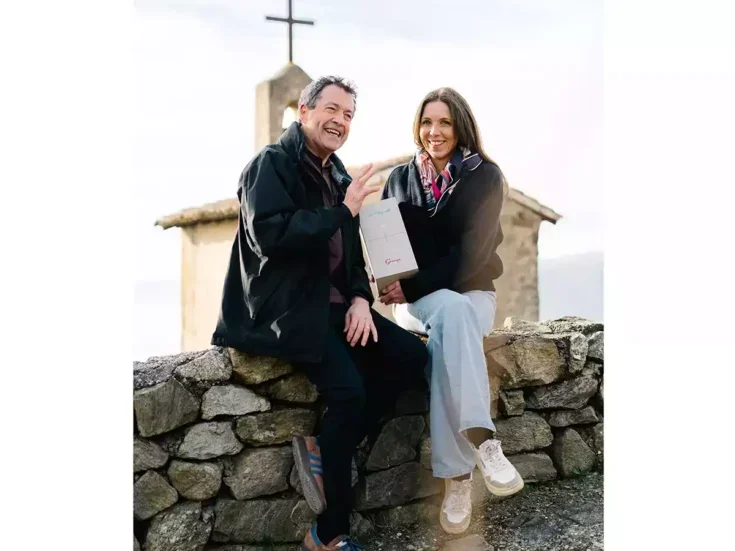
One of the few truly wise men in the world of Spanish wine passed away recently in Jerez de la Frontera. A warm and affectionate man, Mauricio González-Gordon Díez died shortly before turning 90, just a few weeks after his own wife, Milagro López de Carrizosa. The transition between the summer and autumn of 2013 will be remembered as a tough one for the González family, to whom we would like to express our most heartfelt condolences.
One might think that writing a suitable eulogy in memory of Mauricio González was an easy task. And indeed that might be true insofar as Don Mauricio was cultivated yet modest, powerful but warm, wealthy as well as generous — a true jerezano no less than a man of the world. He distilled good feelings and summarized all the virtues found perhaps only in the ideal obituary — a genre that is often oblivious to the true character of the deceased. This, I would say, makes the task more difficult: Don Mauricio was such a noble, affectionate person that those who never met him may think my words here are but the customary hyperbole demanded by the genre. They are not: They are nothing but the plain truth.
We tend to price our lives, as well as those of others, in terms of gains and losses. As human beings are plagued with defects, it is hard to avoid a fixation with the material. How much nobler would it not be to place emphasis where it is due, on the affective and intellectual fortune we have built up or dilapidated for ourselves and those around us. In the end, it is all about the children we raise, the projects we undertake, the texts we write, the memories we leave, but especially the people we meet and frequent and the nature of those relationships. In the case of Mauricio, it should suffice to see the devotion and tenderness with which his people referred to him and looked after him in his final years. It is clear that during his life he amassed a colossal amount of respect and affection.
Late meetings with Don Mauricio
I only met him during the last decade and a half of his life, which enabled me to see him in action at his own office in González Byass while he still enjoyed secretary personnel that managed his agenda directly. Thanks to an initial encounter arranged by my dear friend Jorge Pascual, I could finally hold a number of conversations with Don Mauricio in the noble chambers at the cellaring facilities of González Byass – itself a modest city in size and complexity. I will forever treasure those moments. Most memorable was a coffee afternoon joined by another sage, Álvaro Girón, that stretched well into the evening. The meeting originated in the curiosity of Don Mauricio, who had read some of our articles and wanted to meet us to discuss Amontillado and Palo Cortado.
As is often the case with people of true merit, he contacted us so courteously and modestly that we felt overwhelmed; after all, we were the privileged ones. I remember his sharp observations about the relationship between the maritime lexicon and the idiomatic expressions used in the wine cellars. Those evenings should be bottled to be enjoyed again and again, so that every word and every nuance be preserved.
As Maruicio aged, his public availability diminished, and in his final seven or eight years it was no longer possible to phone or email him directly. It became evident that the people around him were deeply concerned about his health. It is hard to reflect how loved he must have been by José Argudo, Antonio Flores, his grandchildren, and the rest of his family. Even so there was still time for another unforgettable exchange with him in December 2007. Together with scriptwriter Andrés Alés, I had sketched a storyline for a documentary on Jerez and Sherry, and we were — still are — very enthusiastic about the project, despite the economic crisis that made it unfeasible at the time. For reasons obvious to anyone who can spell Sherry, Mauricio was bound to play a principal role. Our friends at González Byass were kind enough to grant us access to Mauricio on condition that the meeting should not last beyond 15 minutes, so as not to exhaust our host’s endurance.
After a few moments, the great man started to feel so at ease that the coffee party — morning coffee this time — lasted a good couple of hours. During those hours, Mauricio told us about the Sherry Trials in London, his father, and the figures who for a long time were his competitors in business but also close friends and even relatives (in the House of Domecq). He told us about the world of Sherry he knew in his youth and, later, his vision for its present and future. This was all graced by the serenity he always managed to transmit, never dropping his natural modesty. As producer Antonio Saura ingeniously noted — as we left along Manuel María González Street under the shadow of the Alcázar – it was a shame we did not take a camera that day. We would have had half the footage in one shoot.
A peculiar, superior Andalusian
Mauricio González-Gordon Díez was a peculiar Andalusian and Spaniard in several aspects, beyond his evident gentility and – if I may be allowed — a subtle British restraint. (He was born in Hampton Hill.) When I say peculiar, I mean superior, because he made the best of his privileged education and the opportunities that life granted him — even better than most people in similar situations. Most unusually, he was a fervent advocate of science and innovation, a man ahead of his time in his defense of research and scientific innovation — against what regrettably has been the norm among our compatriots, especially among our political leaders. One of his favorite topics (together with birds and nature, the sea and sailing) was the contribution made by the house of González Byass (and more specifically his father Manuel González Gordon) to the scientific knowledge of Sherry. The recruiting of Justo Casas and the creation of the Centro de Investigación Enológica made him specially proud — and rightly so, not only as the son of the then president of the corporation but also regarding his own participation in this process.
Appropriately, he referred to the latter only tangentially. Whenever he described some merit, he would attribute it to someone else, be it his father or some other character. Indeed, in order to know the true value of someone, there is nothing quite like listening to him or her talking about themselves and their own achievements. The proportion is inverse, as in the popular Spanish refrain about bragging as protesting too much: Dime de qué presumes y te diré de qué careces. Don Mauricio did not know the meaning of the verb “to brag.”
While it was indeed exceptional that a wealthy and aristocratic (and also powerful, though of course he never mentioned it) Andalusian businessman spearheaded scientific research, it was even more shocking that he managed to harmonize that with a solid admiration for business practice. Those of us fortunate enough to have conversed with Mauricio González-Gordon know that another of the reasons why he admired his father so much — beyond the latter’s monumental Sherry bible or the natural devotion of a son for his father — was Manuel María González Gordon’s devotion to his business, to his concept of what the family company should be.
Again, it is a pity that there are no voice records of Mauricio telling stories of his father driving through Spain and stopping at each and every bar and restaurant to chat with the managers — whom he knew by their first names — and make sure they remained loyal to the brands Tío Pepe, Néctar, Alfonso, against the fierce competition. Don Mauricio would then lower his voice confidentially, as if not wanting to blame anyone, and add, “I suspect business would be much better in Jerez if that direct contact between wine producers and the people who pour it for the consumer had not become a thing of the past.”
Another sorry aspect of Spanish character is our short memory and disinterest for the legacy of the best among us. The Sherry district provides several examples of this, such as the general ignorance of the work of major figures like Isidro García del Barrio or Diego Parada y Barreto. Or, to mention a venerable man in his 90s still among us, Justo Casas, whose treatise on Sherry in the 20th century is a fundamental book for understanding the Sherry district and its wines. Ditto the general indifference toward the recent bicentenary of the two world-class scientists Esteban Boutelou and Simón Clemente. It is, however, likely that the legacy of Mauricio González- Gordon Díez will not be lost among his neighbors and wine lovers at large, for the relevance of González Byass as a company will ensure the preservation of his memory as a profound, honorable, and elegant man.
A final privileged place
I can modestly pride myself for having been treated as a friend by Mauricio and having learned a few important things from him. Looking at pictures of his last years, I cannot help but get emotional. He was a noble person who must have left his mark on those who knew him, and for the house of González he represents yet another good reason for the great González Byass family to persist in their effort to push the level of excellence of Sherry even higher for many decades more. I hope that 15 or 20 years from now, we Sherry lovers should be able to celebrate that these extraordinary wines have recovered the worldwide prestige (and sales figures) they deserve and raise our glasses to the memory of some of the people who helped lay the foundations for that recovery while suspecting they might not live to see it. Among them, doubtless, a place of privilege shall be reserved for Don Mauricio González-Gordon Díez.






